形容词和副词-精选.
形容词和副词
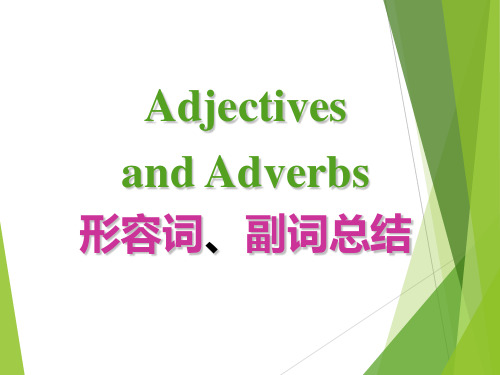
Good —— well
好
好地(当表示身体好时,是形容词)
四、功能
口诀:形名、副动、系形
1、形容词修饰名词,作定语,放前面。A prettruns quickly. 3、系动词+形容词
系动词
五、常考形容词
1、enough 足够两面派: Enough+名词 见到名词跑前面 enough money 形/副+enough 见到形/副躲后面 rich money 2、 alone独自的/地 live alone
( 3 ) too….to 太…而不能 too+形容词+to+动词原形 She is too fat to walk.
七、比较级 1、标志词
than(比….)
两者相比较
2、比较级的类型
递增比较:A+动词+比较级+than+B 递减比较:A+动词+less+原形+than+B 同级比较:(肯定)A+动词+as +原形+as+B
Hainan is a most beautiful city.
九、比较级、最高级的变化规则(单、双、多、特)
单音节:1、一般情况下+er/est. Fast-faster/fastest 2、以不发e结尾,+r/st. Nice-nicer/ nicest
双音节:3、以辅音字母+y结尾,将y变i+er / est. pretty-prettier/ prettiest, easy-easier. 4、以辅元辅且重读结尾,双写尾字母+er / est. hot-hotter / hottest, fat-fatter / fattest
形容词副词讲义(精选.)

形容词副词定义:中文的意思是“……的”的词是形容词,用来修饰名词;中文意思是“……地”的词是副词,用来修饰动词、形容词或副词形容词与副词在句中的位置形容词形容词的比较级在句中的位置名词所有格副词的比较级形容词副词的转换考点清单练习:练习①It is a ____(sun) day.②It is a _____(rain) day.③I think you are a _____(luck) girl.④The teacher said he had _____to tell us.A. anything importantB. important anythingC. something importantD. important something⑤Look !Jack is ____(excite,excited) .⑥I feel ____(happy) every day.⑦The baby is sleeping ,please keep______(quiet,quietly)考点二:形容词的比较级(1)在形容词词尾加上“er”“est”构成比较级、最高级:bright(明亮的)—brighter—brightest broad(广阔的)—broader—broadest cheap(便宜的)—cheaper—cheapest clean(干净的)—cleaner—cleanest clever(聪明的)—cleverer—cleverest cold(寒冷的)—colder—coldestcool(凉的)—cooler—coolest dark(黑暗的)—darker—darkest dear(贵的)—dearer—dearest deep(深的)—deeper—deepestfast(迅速的)—faster—fastest few(少的)—fewer—fewestgreat(伟大的)—greater—greatest hard(困难的,硬的)—harder—hardest high(高的)—higher—highest kind(善良的)—kinder—kindestlight(轻的)—lighter—lightest long(长的)—longer—longestloud(响亮的)—louder—loudest low(低的)—lower—lowestnear(近的)—nearer—nearest new(新的)—newer—newestpoor(穷的)—poorer—poorest quick(快的)—quicker—quickest quiet(安静的)—quieter—quietest rich(富裕的)—richer—richestshort(短的)—shorter—shortest slow(慢的)—slower—slowestsmall(小的)—smaller—smallest smart(聪明的)—smarter—smartest soft(柔软的)—softer—softest strong(强壮的)—stronger—strongest sweet(甜的)—sweeter—sweetest tall(高的)-taller-tallestthick(厚的)—thicker—thickest warm(温暖的)—warmer—warmest weak(弱的)—weaker—weakest young(年轻的)—younger—youngest (2).双写最后一个字母,再加上“er”“est”构成比较级、最高级:big(大的)—bigger—biggest fat(胖的)—fatter—fattesthot(热的)—hotter—hottest red(红的)—redder—reddestsad(伤心的)—sadder—saddest thin(瘦的)—thinner—thinnestwet(湿的)—wetter—wettest mad(疯的)—madder—maddest(3).以不发音的字母e结尾的形容词,加上“r”“st”构成比较级、最高级:able(能干的)—abler—ablest brave(勇敢的)—braver—bravest close(接近的)—closer—closest fine(好的,完美的)—finer—finest large(巨大的)—larger—largest late(迟的)—later—latestnice(好的)—nicer—nicest ripe(成熟的)—riper—ripestrude(粗鲁的)—ruder—rudest safe(安全的)—safer—safeststrange(奇怪的)—stranger—strangest wide(宽广的)—wider—widestwise(睿智的,聪明的)—wiser—wisest white(白的)—whiter—whitest(4).以字母y结尾的形容词,把y改为i,再加上“er”“est”构成比较级、最高级:busy(忙碌的)—busier—busiest dirty(脏的)—dirtier—dirtiestdry(干燥的)—drier—driest early(早的)—earlier—earliesteasy(容易的)—easier—easiest friendly(友好的)—friendlier—friendliest funny(好玩的)—funnier—funniest happy(开心的)—happier—happiest healthy(健康的)—healthier—healthiest heavy(重的)—heavier—heaviesthungry(饿的)—hungrier—hungriest lazy(懒惰的)—lazier—laziestlucky(幸运的)—luckier—luckiest naughty(调皮的)—naughtier—naughtiest noisy(嘈杂的)—noisier—noisiest pretty(美丽的)—prettier—prettiestsilly(傻的)—sillier—silliest spicy(辣的)—spicier—spiciestthirsty(渴的)—thirstier—thirstiest ugly(丑的)—uglier—ugliest(5).双音节、多音节形容词,在单词前面加上“more”“most”构成比较级、最高级:afraid(害怕的)—more afraid—most afraidbeautiful(美丽的)—more beautiful—most beautifulcareful(仔细的)—more careful—most carefulcheerful(开心的)—more cheerful—most cheerfulcrowded(拥挤的)—more crowded—most crowdeddangerous(危险的)—more dangerous—most dangerousdelicious(美味的)—more delicious—most deliciousdifficult(困难的)—more difficult—most difficultexciting(令人兴奋的)—more exciting—most excitingexpensive(昂贵的)—more expensive—most expensivefamous(著名的)—more famous—most famousfrightened(受惊的)—more frightened—most frightenedfrightening(令人害怕的)—more frightening—most frighteninghard-working(勤奋的)—more hard-working—most hard-workinghelpful(有帮助的)—more helpful—most helpfulhonest(诚实的)—more honest—most honestimportant(重要的)—more important—most importantinteresting(有趣的)—more interesting—most interestingpolite(有礼貌的)—more polite—most politeterrible(可怕的)—more terrible—most terribletired(累的)—more tired—most tired(6).不规则变化的形容词:bad(坏的)—worse—worst far(远的)—farther—farthest (far—further—furthest) good(好的)—better—best ill(病的)—worse—worstlittle(少的)—less—least many(多的)—more—most much(多的)—more—most old(年老的)—older—oldest ( old—elder—eldest) well(好的,身体好的)—better—best练习1. Is your friend ____ (young) than you ?2. Shanghai is one of ______ (big) cities in the world.3. Do you think English is _____important than maths。
(完整版)初中英语常用形容词副词
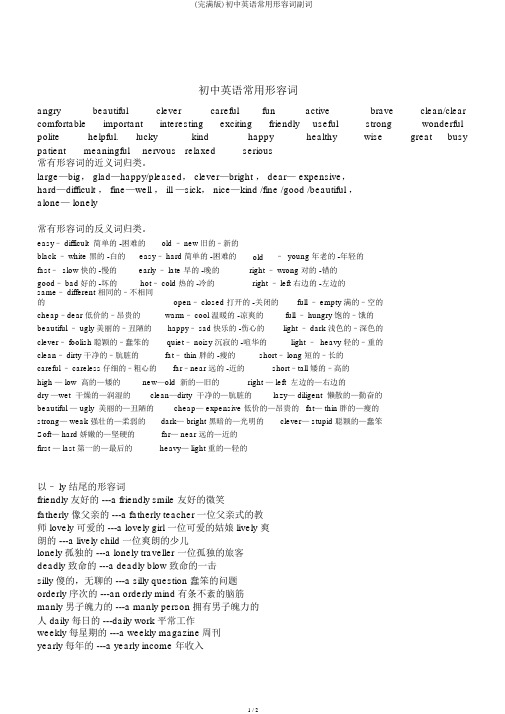
初中英语常用形容词angry beautiful clever careful fun active brave clean/clear comfortable important interesting exciting friendly useful strong wonderful polite helpful.lucky kind happy healthy wise great busy patient meaningful nervous relaxed serious常有形容词的近义词归类。
large—big, glad—happy/pleased, clever—bright , dear— expensive,hard—difficult , fine—well , ill —sick, nice—kind /fine /good /beautiful ,alone— lonely常有形容词的反义词归类。
easy– difficult 简单的 -困难的old – new 旧的–新的black – white 黑的 -白的easy– hard 简单的 -困难的old– young 年老的 -年轻的fast– slow 快的 -慢的early – late 早的 -晚的right – wrong 对的 -错的good– bad 好的 -坏的hot– cold 热的 -冷的right – left 右边的 -左边的same– different 相同的–不相同的open– closed 打开的 -关闭的full – empty 满的–空的cheap–dear 低价的–昂贵的warm– cool 温暖的 -凉爽的full – hungry 饱的–饿的beautiful – ugly 美丽的–丑陋的happy– sad 快乐的 -伤心的light – dark 浅色的–深色的clever– foolish 聪颖的–蠢笨的quiet– noisy 沉寂的 -喧华的light – heavy 轻的–重的clean– dirty 干净的–肮脏的fat– thin 胖的 -瘦的short– long 短的–长的careful – careless 仔细的–粗心的far–near 远的 -近的short–tall 矮的–高的high — low 高的—矮的new—old 新的—旧的right — left 左边的—右边的dry —wet 干燥的—润湿的clean—dirty 干净的—肮脏的lazy— diligent 懒散的—勤奋的beautiful — ugly 美丽的—丑陋的cheap— expensive 低价的—昂贵的 fat— thin 胖的—瘦的strong— weak 强壮的—柔弱的dark— bright 黑暗的—光明的clever— stupid 聪颖的—蠢笨Soft— hard 娇嫩的—坚硬的far— near 远的—近的first — last 第一的—最后的heavy— light 重的—轻的以– ly 结尾的形容词friendly 友好的 ---a friendly smile 友好的微笑fatherly 像父亲的 ---a fatherly teacher一位父亲式的教师 lovely 可爱的 ---a lovely girl 一位可爱的姑娘 lively 爽朗的 ---a lively child 一位爽朗的少儿lonely 孤独的 ---a lonely traveller 一位孤独的旅客deadly 致命的 ---a deadly blow 致命的一击silly 傻的,无聊的 ---a silly question 蠢笨的问题orderly 序次的 ---an orderly mind 有条不紊的脑筋manly 男子魄力的 ---a manly person 拥有男子魄力的人 daily 每日的 ---daily work 平常工作weekly 每星期的 ---a weekly magazine周刊yearly 每年的 ---a yearly income 年收入副词的分类副词按词汇意义可分为:方式副词: well , fast,slowly , carefully , quickly程度副词: very , much, enough, almost, rather, quite地点副词: here, there, out, somewhere, abroad, home哪些单词既是形容词又是副词初中常有的有 :fast, hard, enough, early, late,t,high,far方式副词:well (好地)fast(快地 )carefully(小心地 )quickly (快地)sadly(伤心地)badly (严重地,特别)carelessly(粗心地)slowly (慢慢地)politelyproperly (合适地,完满地)(有礼貌地)proudly (骄傲地),successfully (成功地)happily (快乐地)angrily (生气地,气愤地)。
什么是形容词和副词
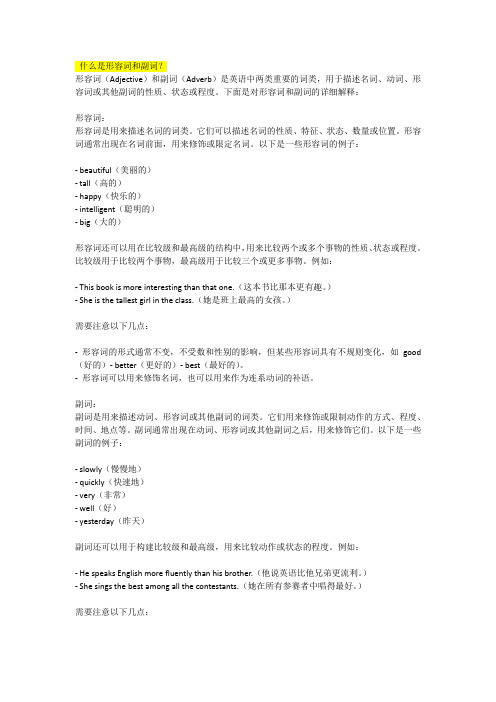
什么是形容词和副词?形容词(Adjective)和副词(Adverb)是英语中两类重要的词类,用于描述名词、动词、形容词或其他副词的性质、状态或程度。
下面是对形容词和副词的详细解释:形容词:形容词是用来描述名词的词类。
它们可以描述名词的性质、特征、状态、数量或位置。
形容词通常出现在名词前面,用来修饰或限定名词。
以下是一些形容词的例子:- beautiful(美丽的)- tall(高的)- happy(快乐的)- intelligent(聪明的)- big(大的)形容词还可以用在比较级和最高级的结构中,用来比较两个或多个事物的性质、状态或程度。
比较级用于比较两个事物,最高级用于比较三个或更多事物。
例如:- This book is more interesting than that one.(这本书比那本更有趣。
)- She is the tallest girl in the class.(她是班上最高的女孩。
)需要注意以下几点:-形容词的形式通常不变,不受数和性别的影响,但某些形容词具有不规则变化,如good (好的)- better(更好的)- best(最好的)。
-形容词可以用来修饰名词,也可以用来作为连系动词的补语。
副词:副词是用来描述动词、形容词或其他副词的词类。
它们用来修饰或限制动作的方式、程度、时间、地点等。
副词通常出现在动词、形容词或其他副词之后,用来修饰它们。
以下是一些副词的例子:- slowly(慢慢地)- quickly(快速地)- very(非常)- well(好)- yesterday(昨天)副词还可以用于构建比较级和最高级,用来比较动作或状态的程度。
例如:- He speaks English more fluently than his brother.(他说英语比他兄弟更流利。
)- She sings the best among all the contestants.(她在所有参赛者中唱得最好。
英语语法--形容词与副词

英语语法一形容词与副词来源:普特英语形容词1.1什么是形容词形容词(adjective)是修饰名词表示名词属性的词,常放在它所修饰的名词之前。
如:a lovely baby 一个可爱的婴儿the beautiful picture那幅美丽的图画modern history 现代历史1.2形容词的用法形容词在句中可用作:1淀语He is a good boy他是个好孩子。
The Chinese Communist Party is a great party 中国共产党是伟大的党。
2)表语The film is both moving and instructive.这部电影很感动人,而且富有教育意义。
I am very glad to see you.见到你很高兴。
3)宾语补足语和宾语一起构成复合宾语。
如:Have you got everything ready for the journey?你行装都准备好了吗?We keep our rooms clean and tidy我们经常保持房间的整洁。
4)相当于名词某些形容词前用定冠词the,变成名词化的形容词,可在句中作主语、宾语等。
如:The young are active.青年人积极好动。
(the young作主语)The blind can learn to read with their fingertips.盲人能够用指尖学习阅读书籍。
(the blind 作主语)He has a keen sense of the new他对新鲜事物有敏锐的感觉。
(the new作宾语)[注一]上述三例中的the young =the young people,the blind the Blind people,the new the new things.[注二]在The sun rose red(旭日升起)中的形容词red和Don't marry young(不要早婚)中的形容词young都是主语补足语。
常见的形容词和副词

常见的形容词和副词在我们的日常生活和写作中,形容词和副词是非常常见且有用的词汇。
它们可以丰富我们的表达,使语言更加生动和精准。
本文将介绍一些常见的形容词和副词,并探讨它们的用法和作用。
一、表示人性格和外貌的形容词1. 年轻的:指某人年龄较轻,常用来形容青少年或拥有精力活力的人。
例句:她是一个年轻的教师,充满着热情和创造力。
2. 高大的:形容某人身材较高、较高大。
例句:他是一位高大的篮球运动员,高度让人畏惧。
3. 聪明的:形容某人智力较强。
例句:这个孩子非常聪明,很容易掌握新知识。
4. 可爱的:指某人或某物令人喜爱或具有吸引力。
例句:那只小猫非常可爱,大家都喜欢和它玩耍。
5. 慷慨的:形容某人乐于助人,愿意给予帮助或贡献。
例句:他慷慨地捐赠了一大笔善款用于救助灾区的人们。
二、表示程度和频率的副词1. 非常:表示程度很高,可以用来修饰形容词或动词。
例句:这本书非常有趣,我一下午都沉浸其中。
2. 比较:表示进行比较,程度中等。
例句:他的成绩比较好,但还有进步的空间。
3. 很少:表示频率很低,事情发生的可能性小。
例句:我很少去夜店,更喜欢在家里安静地阅读。
4. 经常:表示频率较高,事情发生的可能性大。
例句:他经常去健身房锻炼身体,保持健康和身材。
5. 快速地:表示某个动作迅速进行,速度很快。
例句:他快速地跑向终点,赢得了比赛的冠军。
三、表示时间和地点的副词1. 现在:表示当前的时间。
例句:我们现在正在开会,过一会儿就开始讨论下一个项目。
2. 早上:表示上午的时间段。
例句:我喜欢早上跑步,清新的空气让我感到宁静和活力。
3. 那里:表示某个地方的位置。
例句:我想去海边度假,那里的风景一定很美。
4. 这里:表示说话人所在的地方。
例句:欢迎大家来参观我们的展览,这里展示了许多珍贵的艺术品。
5. 外面:表示某个地点或房间之外。
例句:外面下着大雨,我们最好待在室内不出门。
四、表示感情和态度的形容词1. 开心的:形容某人感到愉快、快乐。
形容词和副词的知识点归纳
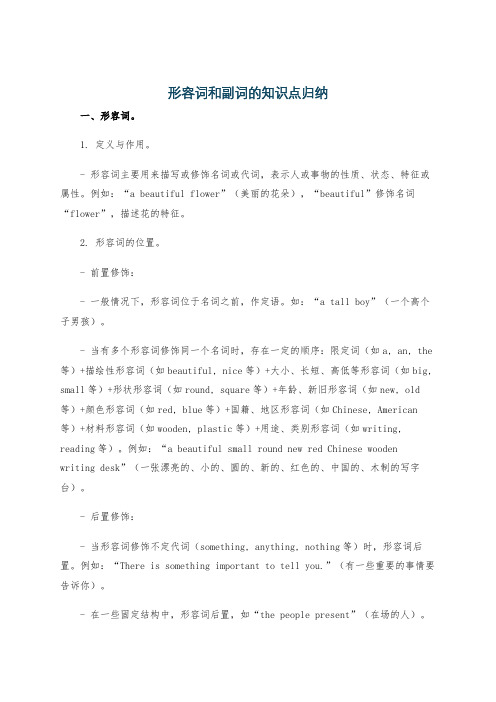
形容词和副词的知识点归纳一、形容词。
1. 定义与作用。
- 形容词主要用来描写或修饰名词或代词,表示人或事物的性质、状态、特征或属性。
例如:“a beautiful flower”(美丽的花朵),“beautiful”修饰名词“flower”,描述花的特征。
2. 形容词的位置。
- 前置修饰:- 一般情况下,形容词位于名词之前,作定语。
如:“a tall boy”(一个高个子男孩)。
- 当有多个形容词修饰同一个名词时,存在一定的顺序:限定词(如a, an, the 等)+描绘性形容词(如beautiful, nice等)+大小、长短、高低等形容词(如big, small等)+形状形容词(如round, square等)+年龄、新旧形容词(如new, old 等)+颜色形容词(如red, blue等)+国籍、地区形容词(如Chinese, American 等)+材料形容词(如wooden, plastic等)+用途、类别形容词(如writing, reading等)。
例如:“a beautiful small round new red Chinese woodenwriting desk”(一张漂亮的、小的、圆的、新的、红色的、中国的、木制的写字台)。
- 后置修饰:- 当形容词修饰不定代词(something, anything, nothing等)时,形容词后置。
例如:“There is something important to tell you.”(有一些重要的事情要告诉你)。
- 在一些固定结构中,形容词后置,如“the people present”(在场的人)。
3. 形容词的比较级和最高级。
- 规则变化:- 一般在词尾加 -er(比较级)和 -est(最高级)。
如:tall - taller - tallest。
- 以不发音的e结尾的单词,加 -r和 -st。
如:nice - nicer - nicest。
形容词和副词
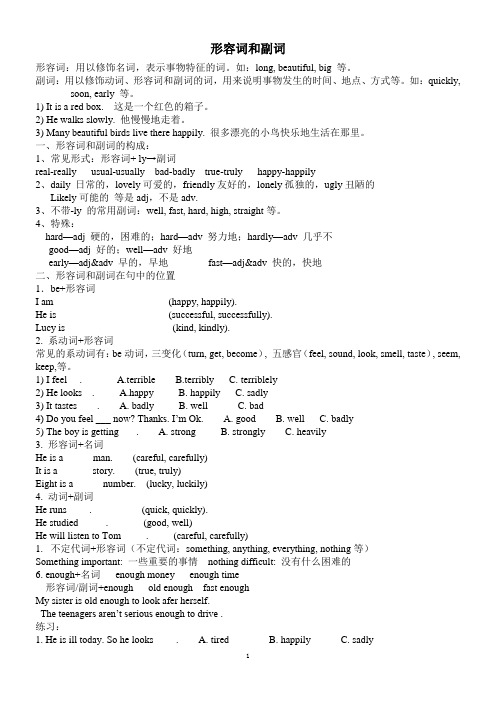
形容词和副词形容词:用以修饰名词,表示事物特征的词。
如:long, beautiful, big 等。
副词:用以修饰动词、形容词和副词的词,用来说明事物发生的时间、地点、方式等。
如:quickly, soon, early 等。
1) It is a red box. 这是一个红色的箱子。
2) He walks slowly. 他慢慢地走着。
3) Many beautiful birds live there happily. 很多漂亮的小鸟快乐地生活在那里。
一、形容词和副词的构成:1、常见形式:形容词+ ly→副词real-really usual-usually bad-badly true-truly happy-happily2、daily 日常的,lovely可爱的,friendly友好的,lonely孤独的,ugly丑陋的Likely可能的等是adj,不是adv.3、不带-ly 的常用副词:well, fast, hard, high, straight等。
4、特殊:hard—adj 硬的,困难的;hard—adv 努力地;hardly—adv 几乎不good—adj 好的;well—adv 好地early—adj&adv 早的,早地fast—adj&adv 快的,快地二、形容词和副词在句中的位置1.be+形容词I am________ (happy, happily).He is ________ (successful, successfully).Lucy is __________ (kind, kindly).2. 系动词+形容词常见的系动词有:be动词,三变化(turn, get, become), 五感官(feel, sound, look, smell, taste), seem, keep,等。
1) I feel __. A.terrible B.terribly C. terriblely2) He looks__. A.happy B. happily C. sadly3) It tastes ___ . A. badly B. well C. bad4) Do you feel ___ now? Thanks. I’m Ok. A. good B. well C. badly5) The boy is getting ___. A. strong B. strongly C. heavily3. 形容词+名词He is a _____ man. (careful, carefully)It is a ______ story. (true, truly)Eight is a _____ number. (lucky, luckily)4. 动词+副词He runs ____. (quick, quickly).He studied _____. (good, well)He will listen to Tom_____. (careful, carefully)1.不定代词+形容词(不定代词:something, anything, everything, nothing等)Something important: 一些重要的事情nothing difficult: 没有什么困难的6. enough+名词enough money enough time形容词/副词+enough old enough fast enoughMy sister is old enough to look afer herself.The teenagers aren’t serious enough to drive .练习:1. He is ill today. So he looks ____. A. tired B. happily C. sadly2. My brother doesn’t feel ___ today. A. good B. well C. happily3. The food smells ___ . I don’t like it A. good B. badly C. bad4. He writes very ____. A. careful B. carefully C. bad5. I study very____. A. hard B. hardly C. careful6. The weather gets ___. A. warm B. warmly C. coldly7. Our country is becoming ___. A. strong B. strongly C. richly8. Is there ____ in the newspaper ?A. something newB. new anythingC. anything new9. There is ___ with my bike. It works well.A. nothing wrongB. wrong somethingC. something wrong10. He speaks ____ for me to understand.A. too slowlyB. slowly enoughC. enough slowly11. He runs ___ to catch up with me.A. too fastB. quick enoughC. quickly enough12. I’m ____ I can’t say a wordA. too happy toB. happy enough thatC. so happy that13.你能给我一些吃的吗? Can you ______________________________?14.老师告诉我们一些有趣的事情. The teacher ______________________.15.他够高可以摘到那个苹果. He is _____________________ the apple.16.他工作够仔细. He works______________.17.他上课不够认真He ____________________.18.这音乐听起来很美妙. ____________________________.19. Tom 看起来不开心. ___________________________.20. 这石头太重, 我帮不动. The stone _____________________ carry.三、形容词&副词的比较级和最高级1. 原级、比较级、最高级的构成规则:1) 直接+er, +est : cold –colder –coldest high—higher—highest2) 以 e结尾的+r, +st: fine –finer—finest nice --nicer --nicest3) 以y结尾的, 改y为i, 再+er. +estEasy--easier --easiest Happy--happier -- happiest1)重读闭音节单词,双写辅音,再+er, +estbig – bigger – biggest sad--sadder—saddest thin – thinner – thinnest6) 多音节词,+more, +mostBeautiful—more beautiful—most beautifulImportant—more important—most importantDelicious—more delicious—most delicious2)不规则变化good / well – better – best ill / bad / badly – worse – worstmany / much – more – most little – less – leastfar – farther / further– farthest / furthest练习:写出下列单词的比较级和最高级small _______ _______ nice ________ _______ big ________ _________ early ______ ________ heavy _______ ______ wet _______ ________late _______ _______cold _______ _______ popular _______ _______ interesting _______ _______old _______ ______ much _______ ______red _______ ______ good _______ ______2. 形容词、副词比较等级的用法与句型:1) 原级:表示两者一样或不一样结构:as + 原级+as not as/so + 原级+asMy friend Kay is as tall as me.My friend Ka y isn’t as/ so tall as me.Exercises:①Joan与Kate一样小心. Joan is _________________ Kate.②我与你学习一样努力。
- 1、下载文档前请自行甄别文档内容的完整性,平台不提供额外的编辑、内容补充、找答案等附加服务。
- 2、"仅部分预览"的文档,不可在线预览部分如存在完整性等问题,可反馈申请退款(可完整预览的文档不适用该条件!)。
- 3、如文档侵犯您的权益,请联系客服反馈,我们会尽快为您处理(人工客服工作时间:9:00-18:30)。
考点一形容词与副词的句法功能对比形容词和副词都是起修饰作用的词。
它们各自的功能如下:词功能例句形容词定语She is a beautiful girl. 她是一个美丽的女孩。
表语The meal is very delicious. 这顿饭很美味。
宾语补足语You must keep the classroom clean. 你必须保持教室清洁。
副词状语He gets up late today. 今天他起床晚。
后置定语(表位置)Life here is rich and interesting. 这里的生活既富裕又有趣。
表语Class is over. 放学了。
定语。
如:a lonely man 一个孤独的人(不能说an alone man)。
2. 有些形容词,如:many,wooden,golden等,只能作定语,不能作表语。
如:This isa wooden house. (但不能说This house is wooden. )。
3. 多个形容词作前置定语修饰一个名词时,其先后顺序一般遵循如下规律:描绘性形容词+形状+年龄或新旧+颜色+地区或产地+材料+用途+名词。
我们可以把上述七条加以简化为:描、形、年、颜、地、材、途。
如:It’s a beautiful tall building. (描、形)It’s a fine old stone bridge. (描、年、材)It’s a nice big old black Chinese wooden writing desk. (描、形、年、颜、地、材、途)4. 若地点副词与时间副词同在一句中,则地点副词在前,时间副词在后。
同一性质的副词,小单位在前,大单位在后。
如:I’m going to meet her at the station in Shanghai at ten o’clock tomorrow.明天上午十点我会在上海车站接她。
例1—It’s very of you to work out the problem for me.—That’s all right.A. kindB. cleverC. necessary解析:句意:“你帮我解出这道题来,真是太好了。
”“不用客气。
”kind“友好的”,符合题意。
答案:A例2—Have some ice cream,please.—Mm,it tastes .A. goodB. betterC. well解析:句意:“请吃些冰激凌吧。
”“嗯,尝起来很好。
”结合句意可知没有比较,故排除B项。
taste尝起来,感官系动词,后加形容词。
good形容词,好的;well副词,好地。
故选A。
答案:A例3Though the old man is ,he doesn’t feel .A. lonely;aloneB. alone;lonelyC. lonely;lonely解析:句意为“虽然这位老人独自一人,但他并不感到孤独”。
alone“单独的”;lonely“孤独的”。
答案:B考点二形容词与副词的构成由形容词构成副词时,有以下几种方法:1. 大多数形容词在词尾加-ly。
如:careful—carefully;quick—quickly;bright—brightly;polite—politely2. 以“辅音字母+y”结尾的形容词,把y变成i,再加-ly。
如:easy—easily;happy—happily;lucky—luckily;heavy—heavily3. 以“元音字母+e”结尾的形容词,需去e再加-ly。
如:true—truly4. 以le结尾的形容词,需去e再加-y。
如:terrible—terribly;simple—simply;possible—possibly【注意】①少数以-ly 结尾的词是形容词,而不是副词,这类词有:friendly(友好的),lonely(孤独的),homely(家常的),motherly(慈母般的),deadly(致命的),lively(活泼的),manly(男子气概的)等。
②有些形容词本身又是副词。
如:alone,far,near,fast,early,late,high等。
例1(用所给词的适当形式填空)It rained (heavy),so he didn’t go to work yesterday.解析:所填词修饰动词rain,应用heavy的副词形式heavily。
答案:heavily例2(用所给词的适当形式填空)The mother looked(angry)at her naughty daughter.解析:angry为形容词,所填词修饰动词look,所以应用其副词形式angrily。
答案:angrily考点三形容词、副词比较等级的构成大多数的形容词、副词都具有原级、比较级和最高级三种形式。
比较级和最高级的构成方式如下:1. 规则变化(1)直接在词尾加-er,-est-est-er,-est(5)多音节词和部分双音节词,在其前加more,mostA. loudB. louderC. loudest解析:than为比较连词,其前应用形容词或副词的比较级。
答案:B例2The you eat,the you will be.A. more healthily;more healthilyB. more healthily;healthierC. healthier;healthierD. healthier;more healthily解析:这里考查“the+比较级... ,the+比较级”句型,即“越……,就越……”。
句意为“你吃得越健康,身体就越健康”。
第一个空用副词healthily的比较级more healthily;第二个空用healthy的比较级healthier。
答案:B考点四比较等级的几种常用句型结构1. “as+形容词/副词原级+as”表示“一者和另一者一样……”。
Mary is as tall as Jane. 玛丽和简一样高。
He can type as fast as she can.他打字能够打得和她一样快。
2. “not... as/so+形容词/副词原级+as”相当于“less+原级+than”,表示“一者不像另一者……”或“一者不如另一者……”。
Jack is not as/so careful as I. 杰克没有我细心。
Lucy didn’t learn so carefully as Mary.露西学习不如玛丽认真。
3. “A+比较级+than+B”结构意为“A比B……”。
Our school is larger than theirs.我们的学校比他们的大。
Peter jumps higher than Bob. 彼得比鲍勃跳得高。
4. “比较级+and+比较级”表示“越来越……”。
As summer is coming,the day is becoming longer and longer. 夏天到了,天变得越来越长了。
It is raining more and more heavily now.现在雨下得越来越大了。
5. “the+比较级,the+比较级”表示“越……,越……”。
The warmer the weather is,the better the crops will grow. 天气越暖和,庄稼长得就越好。
The harder you work,the better you’ll learn.你越努力,学得就越好。
6. “A+... +the+最高级+in/of/among... /定语从句”表示“在某范围内A最……”。
Tom is the tallest in his class.汤姆是他班里最高的。
She is the most beautiful of us all.她是我们当中最漂亮的。
考点五比较等级之间的转换1. 原级与比较级之间的转换,可用“less+原级+than”替换“not so/as+原级+as”。
Our garden isn’t as/so beautiful as theirs.→Our garden is less beautiful than theirs.2. 比较级之间的转换。
常改变比较对象的位置或使用反义词。
My sister is three years older than I.→I am three years younger than my sister.3. 最高级与比较级之间的转换。
A. 用“比较级+than+any other+名词单数”。
如:Tom runs fastest in his class.→Tom runs faster than any other student in his class.B. 用“比较级+than+all the other+名词复数”。
如:She is the most beautiful girl in the school.→She is more beautiful than all the other girls in the school.C. 用“比较级+than+anyone/anybody/anything+else”。
如:John is the tallest here.→John is taller than anybody else here.D. 用“否定词+比较级+than”。
如:Health is the most valuable for us.→Nothing is more valuable than health.E. 用“否定词+... +as/so+原级+as”。
如:Jim is the most diligent student in our class.→No student is so diligent as Jim in our class.4. 表示倍数,如“/两倍/三倍/四倍/……”用“twice/three/four/... times+as... as... ”结构。
This book costs three times as much as that one.这本书的价钱是那本书的三倍。
An elephant is about ten times as heavy as a horse.大象约有马的十倍重。
例(根据上句完成下句)A:Mike is 17 years old and Kate is 15 years old.B:Kate is two years Mike.解析:由上句可知,Mike 17岁,而Kate只有15岁,所以Kate比Mike小两岁,用英语表示为two years younger than... 。
